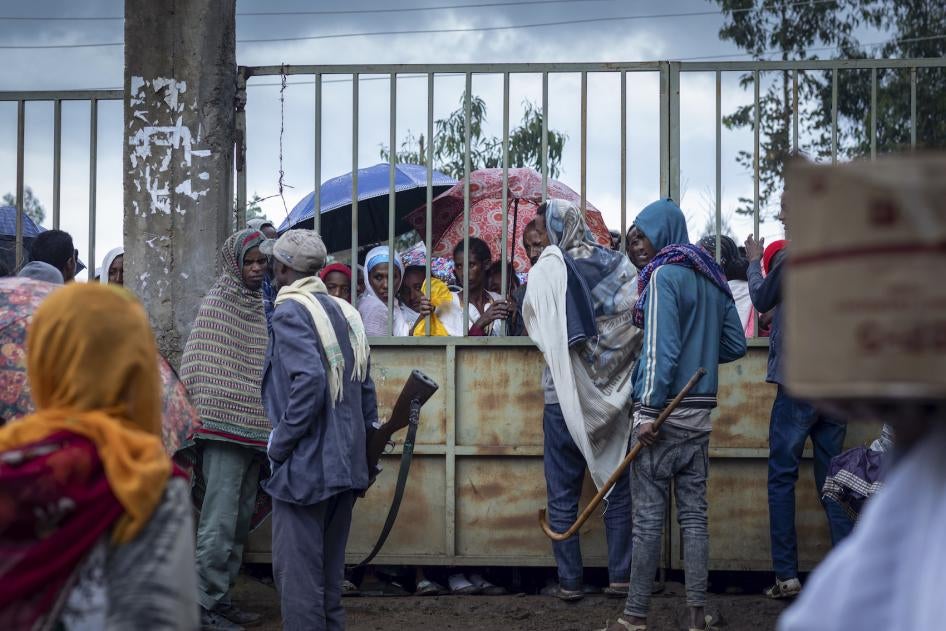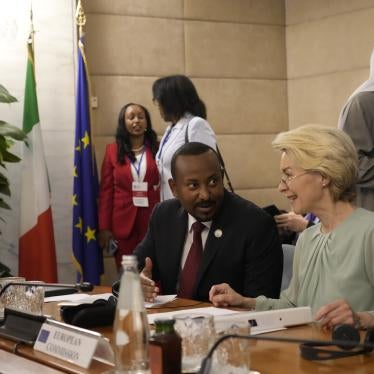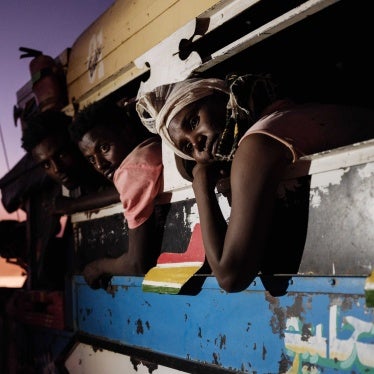Two years after the outbreak on November 3, 2020 of armed conflict in Ethiopia’s Tigray region, the two main warring parties signed a cessation of hostilities agreement, ending active fighting.
All the parties to the conflict in northern Ethiopia, committed serious violations of the laws of war and human rights violations and abuses. Since the November 2022 agreement, Eritrean forces in Tigray have carried out killings, rape, and other forms of sexual violence, and looting in areas under their control, while Amhara security forces have continued to carry out an ethnic cleansing campaign against Tigrayans in Western Tigray Zone. In August, intensifying clashes between the Ethiopian military and local militias known as Fano in towns across the Amhara region have resulted in hundreds of casualties, including children, refugees, and humanitarian staff.
The Ethiopian government declared a broad state of emergency in the region with mass arrests of ethnic Amharas since reported in the region and in Ethiopia’s capital, Addis Ababa.
Despite repeated demands from victims of abuses and their families for meaningful justice and redress for abuses, the cessation of hostilities agreement lacked details on formal accountability, notably on the types of mechanisms that could investigate alleged crimes for future prosecution, referencing instead the government’s commitment to implementing a “transitional justice policy framework to ensure accountability, truth, reconciliation, and healing.”
While Ethiopian officials contend that the steps they have taken since the agreement demonstrate a commitment to accountability, concerns remain over weaknesses and independence of the justice sector, the credibility and scope of investigations conducted so far, normative gaps within Ethiopia’s domestic laws to criminalize atrocity crimes, and, most importantly, the political will to ensure comprehensive justice and redress for victims of serious abuses. Survivors over the past four years have repeatedly expressed mistrust in Ethiopia’s domestic processes.
Ongoing international scrutiny and investigations are needed. The International Commission of Human Rights Experts on Ethiopia (ICHREE), established by the United Nations Human Rights Council in December 2021, is the only existing body with the expertise and mandate to independently investigate abuses committed in Ethiopia since November 2020, and collect and preserve evidence for future prosecutions. ICHREE’s current mandate expires in September 2023. The Human Rights Council at its September session will need to renew ICHREE’s mandate so it can continue its work.
This Question and Answer document, addresses key issues in bringing justice for widespread atrocity crimes – including war crimes and crimes against humanity, the crucial role that the ICHREE plays to support accountability, redress, and other forms of transitional justice, and the need to reverse the Ethiopian government’s longtime practice of launching investigations in response to public pressure about human rights abuses without taking meaningful action. It calls on Human Rights Council member countries to support the renewal of the commission’s mandate for another year.
- What has been the human rights situation in Ethiopia since the signing of a cessation of hostilities agreement to the conflict in northern Ethiopia?
The human rights and humanitarian situation in Ethiopia remain dire.
Since the signing of the November agreement, human rights abuses, including killings and sexual violence have continued in Tigray. Eritrean forces remain in parts of the region and have obstructed humanitarian assistance and are reported to have kidnapped people and pillaged property in areas they occupy. In Western Tigray Zone, authorities and Amhara regional forces and militias known as Fano continued an ethnic cleansing campaign and forcibly expelled Tigrayans.
Rights abuses also continue elsewhere in the country.
In April, violence erupted in the Amhara region following the government’s plans to dismantle regional special forces in the country and integrate them into the regular police or military. The government blocked mobile internet access and began military operations against Fano militias that had seized control of major towns in the region. Authorities arrested several journalists who had been reporting on developments in the region.
By early August, clashes intensified, and reports of civilian casualties and damage to civilian infrastructure increased. The government then declared a sweeping state of emergency in the region that restricts basic human rights and grants the government broad powers to extend the emergency declaration throughout the country as needed. Arbitrary arrests, including of opposition politicians, have been reported in Ethiopia’s capital, Addis Ababa.
In Oromia, a long simmering and abusive government counterinsurgency campaign against an armed group, the Oromo Liberation Army, has been underway since 2019. The operation resulted in serious rights abuses against the civilian population, including arbitrary detentions, summary executions, and large-scale massacres. Similar abuses are continuing in 2023 according to reporting from the Ethiopian Human Rights Commission and the media.
- How has the Ethiopian government responded to calls for accountability for conflict-related abuses in northern Ethiopia or in response to reports of serious abuses elsewhere in the country?
When Prime Minister Abiy Ahmed took office in 2018, he committed to addressing past wrongs. Later that year he established a reconciliation commission with a broad mandate, but without public consultations. It dissolved three years later without any visible achievements. National authorities also took steps towards justice for past abuses by bringing charges against high-ranking government officials. However, those investigations were limited in scope and appeared selective, as many other officials implicated in serious violations – including in the Somali, Oromia, and Gambella regions – never faced investigations, let alone trial. Charges against officials were soon dropped.
Following serious violence in 2019 and 2020, the government committed to bringing those responsible for abuses to account. Yet, investigations and promises of compensation were slow or quietly discontinued, leaving grievances unaddressed.
Resistance to independent investigations and monitoring
During the conflict in northern Ethiopia, the Ethiopian government denied or downplayed credible reports of grave abuses committed by the Ethiopian military and allied forces, while limiting or attempting to silence independent reporting and criticism through the expulsion of diplomats, UN staff, and international journalists.
Since the UN Human Rights Council established the ICHREE in late 2021, the government has tried to cut its funding on multiple occasions. In July 2022, the government set forth its requirements to cooperate with ICHREE that would entail inappropriate interference with the independence of its work. In March, authorities threatened to introduce a resolution at the Human Rights Council that would prematurely terminate the ICREE’s mandate. The government also refused to cooperate with and resisted the work of the African Commission on Human and Peoples’ Rights (ACHPR) Commission of Inquiry on Tigray – who’s investigation ended in May, without the release of a public report on its findings and recommendations.
Lack of progress on investigations for international violations committed in northern Ethiopia
Domestic investigations and initiatives taken so far have raised serious concerns whether such processes can meet international standards of impartiality, independence, and transparency. Preliminary findings by the Ethiopian government into abuses committed in Axum in Tigray in November 2020 ignored the role of Ethiopian forces in extrajudicial executions and pillage of civilian infrastructure and property, as well as the massacre by Eritrean forces of hundreds of civilians over 24 hours. In 2022, the government acknowledged that its investigation was not fully completed but continued to suggest that the majority of those killed died in fighting, in stark contrast with the findings by domestic and UN rights bodies.
Subsequent government investigations into abuses by Ethiopian federal and regional forces have been opaque or intended to deflect pressure for international investigations rather than genuinely advancing justice and redress.
In late 2021, the Ministry of Justice established an Inter-Ministerial Task Force following the release of the joint report by the Office of the UN High Commissioner for Human Rights and the national Ethiopian Human Rights Commission. The Task Force released its first report in September 2022, providing an update on the status of investigations into conflict-related abuses in Tigray.
The Task Force report stated that as of August 2022, Ethiopia’s closed military courts handed down 25 convictions and 2 acquittals. However, no further information has been made public on the findings of these investigations and trials, the rank of Ethiopian federal force personnel involved, locations where incidents occurred, how abuses implicating regional forces have been investigated, or clarity on participation of survivors or family members in the proceedings.
The Ethiopian government’s reliance on the military court system to try serious violations committed by Ethiopian military forces continue to lack transparency and raise concerns about due process and justice and redress for victims and survivors of heinous crimes. At present, military court judges are appointed at the recommendation of the Minister of Defense, or the commander-in-chief of the armed forces at the recommendation of the Minister, which raises serious issues about the impartiality and independence of military courts.
The Task Force report also stated that violations in Western Tigray Zone would be investigated by December 2022. The government so far has not released details of these investigations, nor taken any action to hold anyone responsible despite reports that authorities and forces present in the Zone have continued an ethnic cleansing campaign against Tigrayans since the November 2022 ceasefire agreement.
In January 2023, the Ethiopian government released a draft “Policy Options for Transitional Justice” (Green Paper), as a starting point for public consultations. The government began seeking public input through a process that began in February and will reportedly be completed by September 2023, but communities in many parts of the country, including in the Amhara region and parts of the Oromia region, are still affected by fighting. Political opposition groups, civil society groups, Ethiopian human rights experts, as well as those taking part in the consultations have already expressed criticism over the policy document’s focus on the principle of sovereignty, the inclusiveness of the consultations, and the timeliness of the discussion while fighting was ongoing. In Tigray, participants reportedly raised concerns over the document’s failure to address how Eritrean forces may be held to account.
- The government has invited the UN human rights office to monitor the human rights situation in northern Ethiopia. What is the difference between the investigative mandate of ICHREE and work by UN human rights monitors?
The federal government has accepted monitoring work on the human rights situation in northern Ethiopia, by the UN Office of the High Commissioner for Human Rights, as well as the Ethiopian Human Rights Commission. Human rights monitoring work, however, is very different from the work of independent investigative mechanisms, such as the UN-mandated commission of experts on Ethiopia (ICHREE).
Fact-finding and independent mechanisms are often established by decisions of UN bodies or regional human rights institutions to respond to crisis or complex human rights situations. They play a crucial independent fact-finding and investigative role, to strengthen human rights protection and publicly report on abuses of international human rights and humanitarian law by the parties to the conflict. They document abuses, gather, and preserve evidence, analyze the nature of the crimes documented, and when possible, identify perpetrators and assist in advancing accountability and redress for victims of serious crimes. ICHREE, for instance is mandated to collect and preserve evidence of serious crimes, and to identify those responsible, with a view towards making such information accessible and usable in support of ongoing and future accountability efforts. They can also play an important role towards transitional justice efforts that focus on truth-seeking and preserving a historical record.
Human rights monitoring work, often carried out by national human rights institutions, civil society groups, or by the UN Office of the High Commissioner for Human Rights through its field or country offices, plays an important role in monitoring the human rights situation in the country as they occur and bringing this to the attention of relevant authorities and human rights bodies, as well as providing technical human rights advice. They are not equipped to document past violations that may constitute international crimes, and are not mandated to preserve evidence, identify those responsible, or build case files for future accountability.
Ethiopia’s donors have supported the deployment of three OHCHR international human rights monitors to the Tigray and Amhara regions. It is not clear whether or how the UN human rights office will publicly report on the findings of the monitors. Though the work of the monitors is important, monitoring work is not a substitute for comprehensive criminal investigations.
- Why is an independent investigative mechanism on Ethiopia still needed if the government is pursuing investigations and starting a transitional justice process?
Since 2018, initiatives by the government into serious rights abuses have not effectively investigated human rights violations and abuses, raising questions about the capacity and independence of Ethiopia’s investigative and judicial institutions.
Federal and regional investigative authorities have violated the due process rights of high-profile detainees, such as critical journalists or political opposition figures, by forcibly disappearing them or holding them incommunicado, denying them access to their lawyers and family members for weeks or months, or moving them between makeshift and official detention sites.
Concerns also remain over the influence that Ethiopia’s federal and regional authorities have over judicial processes, where investigative authorities have routinely appealed or ignored court decisions in cases involving critics of the government or opposition figures.
There have also been cases where investigations and judicial decisions have been subject to political interference, compromising the ability of domestic bodies to act with impartiality and independence. For example, in October 2022 police detained three Supreme Court judges in the Oromia region after they granted bail to six security personnel of the opposition political party leader.
The increasingly repressive environment has eroded civic space in the country, with government harassment and detention of critical voices forcing journalists, opposition members, and civil society activists into silence or exile.
Following widespread reports of brutal sexual violence against women and girls in Tigray in early 2021, the Ethiopian government set up a task force team to investigate the claims. Officials tried to revise the task force’s findings to omit reports of rape by Ethiopian and Eritrean forces, according to a former federal minister charged with creating the team.
The government has also largely failed to credibly investigate and prosecute atrocity crimes, including war crimes and crimes against humanity, committed by federal and regional forces, and Eritrean forces during the conflict in northern Ethiopia. During its March oral update at the UN Human Rights Council, ICHREE also raised concerns about the lack of domestic pathways for accountability for serious violations committed by Eritrean forces in Ethiopia.
Though the Ethiopian government has announced a three-year plan to reform and overhaul the justice sector, ongoing independent investigations that can impartially document reports of gross human rights abuses and collect information for evidentiary purposes, are still needed for there to be any chance of genuine accountability.
It is unlikely that ICHREE will have finalized a comprehensive investigation of crimes committed during the conflict in northern Ethiopia by the end of its current mandate in September 2023 given the scale of the abuses committed since the beginning of the conflict.
- What are victims of human rights abuses in Ethiopia calling for?
Recent victims of serious human rights abuses in Ethiopia and their families have been consistent in their calls for basic acknowledgment by the Ethiopian government of the harm they’ve suffered, justice and accountability for those most responsible for abuses, and redress for what they have lost, according to Human Rights Watch research since 2020. However, they have expressed a lack of trust in state institutions and continue to seek greater international attention to their suffering and for action to end impunity.
- Why is documentation and evidence preservation so important?
As violence continues in Ethiopia, it is implausible to ask victims of grave abuses to wait for the outcome of a domestic transitional justice process or for domestic investigations. Any such process may come too late for those affected. Accountability that victims and concerned governments have been calling for requires a prompt and credible assessment of the abuses. There is a great need to gather evidence, and properly preserve such evidence that is available for future accountability mechanisms, including domestic ones, that meet international standards. Otherwise, there is a risk that such evidence gets lost due to a lack of investigations or is intentionally destroyed, further undermining prospects that victims can obtain justice in the future.
- What should members of the UN Human Rights Council do at its 54th session?
Members of the UN Human Rights Council at its 54th session in September-October 2023 should ensure the Council adopts a resolution renewing the mandate of the International Commission of Human Rights Experts on Ethiopia (ICHREE). Only comprehensive collection and continued preservation of evidence will make prospects of future accountability viable for victims. Now is not the time for the Human Rights Council to terminate its investigations by letting the ICHREE mandate lapse.







